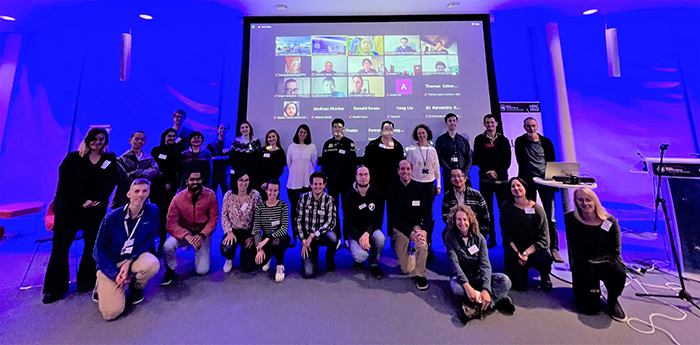
All models have strengths and weaknesses, all observations are uncertain and comparisons between the two involve inevitable caveats. This workshop provided an opportunity for 80 scientists (in-person and online) to share and discuss advances in the combined use of climate models, observations, and reconstructions across timescales from short-term extreme events to longer-term climatological means. The workshop took place between 28-30 September at the British Antarctic Survey (BAS). Talks and breakout discussions considered not only the physical atmosphere-ocean-ice components of the Antarctic climate system but also interactions with biological systems. Data access and analysis relevant to AntClimNOW problems were also addressed.
Workshop themes were divided in morning sessions talks and afternoon breakout discussions. In first day, the main emphasis was AntClimNOW relevant atmospheric processes across spatial scales (from cold cloud microphysics to modes of variability such as the SAM). The second day focused on ocean and sea-ice processes and Antarctic surface meteorology and climatology (linked with a concurrent Polar CORDEX meeting). The last day focused on multi-disciplinary studies (such as cross-disciplinary links to ecosystems and applications of machine learning).
Participants were asked to give a 15-minute presentation followed by questions and discussions.
For each of the focused sessions there were invited keynote lectures:
- Developing physical parameterizations in climate models from observations in Antarctica: recent advances and challenges (Etienne Vignon)
- Challenges and opportunities in observing and modelling the Southern Ocean (Joellen Russell)
- Climate model evaluation in Antarctica, from large scale and surface climatologies to event-scale water-isotope studies (Cecile Agosta)
- Antarctic ice shelves: At the intersection of ocean, atmosphere and sea ice (Diana Francis)
After the keynote presentations, participants presented their talks on a variety of topics covering the validation of numerical models with observations addressing model biases and observation uncertainties.
The afternoon discussion sessions focused on four topics:
- Datasets and tools
- Grand challenges and opportunities in bringing together observations and models
- Exploratory multi-annual forecasts of Antarctic sea ice
- cross-disciplinary links to ecosystems / biology
Discussions involved audience wide participation (both in-person and online) where important themes were raised such as easy-access to datasets; access to common tools and techniques for comparing observations and model data. Other issues considered were internal variability and uncertainty (both in observations and models), how to establish real-world behavior from short records. Ocean convection and deep-water formation in the Southern Oceans.
At the end of the workshop the group agreed to create two main outputs:
- Information on observations and model data of relevance to the AntClimNow aims along with contact points working in these areas.
- Tools and techniques for comparing observations and model data.
There was a strong hybrid element to the workshop, with significant online participation. Of particular importance was participation of Early Career Scientists (ECR’s), which was greatly enhanced through AntClimNow travel grants. We thank SCAR for providing the support that made this possible – we could not have had such a successful workshop without help from Johanna Grabow, Eoghan Griffin, Rosemary Nash and Chandrika Nath. The British Antarctic Survey are also thanked for providing their premises for the workshop.
